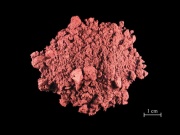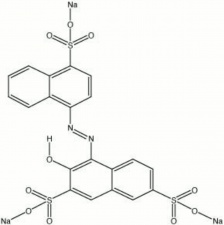Amaranth (dye)
Description
A dark, reddish-purple synthetic dye. Amaranth was developed in 1878 by H. Baum. It is a water soluble Azo dye derived from Coal tar. Amaranth is a nonpermanent color used as a colorant in textiles and color photography. It was banned by the FDA in 1976 for use in food and cosmetics.
Synonyms and Related Terms
FD&C Red No. 2; Red Dye No. 2; CI 16185; Acid Red 27; Food Red 9; Ariabel Red 18.42; Pigment Red 193 (on aluminum); amarantti (Fin.); amarant (Ned.); amarante (Fr.); amaranto (Esp.); amaranto (It.)
Other Properties
Soluble in water, glycerol, propylene glycol. Insoluble in most organic solvents.
| Composition | C20H11N2Na3O10S3 |
|---|---|
| CAS | 915-67-3 |
| Density | 1.5 |
| Molecular Weight | mol. wt. = 604.46 |
Hazards and Safety
Suspected carcinogen.
Fisher Scientific: MSDS
Authority
- Colour Index International online at www.colour-index.org Comment: discoverer
- Richard S. Lewis, Hawley's Condensed Chemical Dictionary, Van Nostrand Reinhold, New York, 10th ed., 1993
- The Merck Index, Martha Windholz (ed.), Merck Research Labs, Rahway NJ, 10th edition, 1983 Comment: entry 391
- Website address 1 Comment: http://www.coloria.net/varita.htm - foreign language equivalent terms
- Random House, Webster's Encyclopedic Unabridged Dictionary of the English Language, Grammercy Book, New York, 1997
- The American Heritage Dictionary or Encarta, via Microsoft Bookshelf 98, Microsoft Corp., 1998

